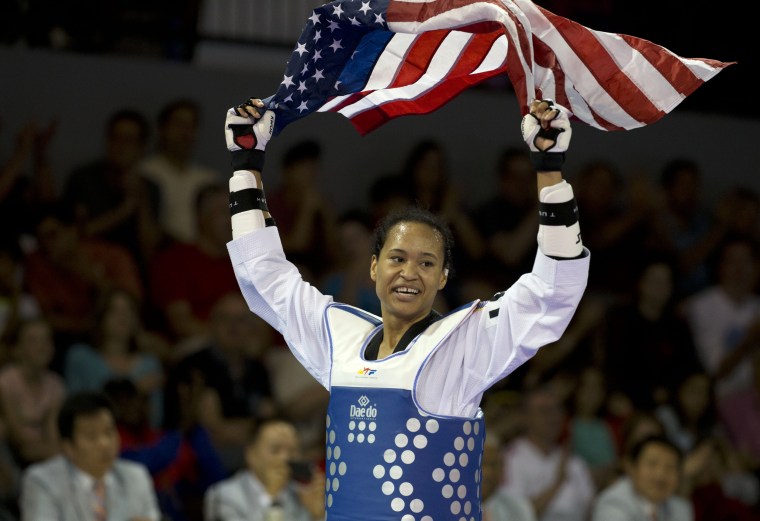Being a world-class athlete requires standing out from the crowd, something Olympian Paige McPherson has a lot of experience with.
The 26-year-old Filipino and black athlete has risen to the top of a sport as multicultural as she is: the Korean martial art of taekwondo.
“I think the one thing that really attracts me to taekwondo is the diversity of all,” McPherson told NBC News. “There’s so many different backgrounds of people and it’s never a specific type of person that always wins — it’s anybody’s day, anybody’s game, anybody’s time to become champion.”
“I guess I can’t really say that I identify with a specific culture. I just happen to be black and I just happen to be Asian — I can’t identify with one more than the other. I am just me.”
McPherson has represented the United States in both the 2012 London and 2016 Rio Summer Olympic Games, taking home a bronze medal during the 2012 competition. Currently, she is preparing to compete in the upcoming World Taekwondo Championship scheduled later this June in South Korea.
“I love traveling and meeting people from other parts of the world and hearing their stories,” McPherson said. “It’s inspiring to see that it really just comes down to your God-given talent and your determination to win, no matter what your background is.”
Taekwondo is defined in Olympic competition by full-contact sparring, where athletes obtain points by forceful kicks and strikes to an opponent.
Previously dominated on the world stage by athletes from Asia, taekwondo has become internationally popular due to the relatively inexpensive training required and, according to McPherson, the recent implementation of an electronic scoring system.
“In basketball you have to be a certain height or certain length to be good,” she said. “In taekwondo, you can be short and fast, or tall and long, even medium-sized and kind of average at everything, and still win.”
The result of athletes participating from five continents is a cultural mosaic founded upon principles of integrity, perseverance, self-control and indomitable spirit — aspects that make McPherson one of the sport’s strongest advocates.
“I think another reason why I’m always intrigued by other cultures is that, in a weird way, I never knew my own,” she said. “Everybody calls me a white person, just because my personality has come from the type of environment I grew up in. I’m always intrigued about my Filipino part and my African-American part.”
McPherson was raised as one of five adoptees in a white family home in Sturgis, South Dakota. Her siblings are of Native American, Caribbean, and Korean descent.
“People use to call us the 'rainbow family' because my parents had adopted us from all over the world,” she said.
Growing up in a small conservative town, diversity was something limited to McPherson’s family, and while taught that there was nothing wrong with being different, being labelled as “the black girl” was something McPherson often found difficulty escaping.
“It was just Caucasian and then me, my sister, and my brother from Korea,” she said. “There was a lot of racism back there but my parents really kept me away from it. I do remember a time when one of my neighbors had told my parents that if my sister or myself came around his property, we would be shot. That’s probably the time when I started understanding that it was because of my skin.”
McPherson said she is thankful for the family support that’s allowed her to always be herself. Taekwondo gave her that too, she noted.
“It was that little home away from home where kids accepted me,” she said. “There were kids around me that were a little bit different. It just grew into my family.”
Following in the footsteps of her older brother Evan, McPherson officially began training at the age of 7, where practicing an approximate three times a week led to winning at tournaments and a subsequent move to Miami in 2009 to train with Olympic coach Juan Moreno. She wanted to see how far she could go.
“When people looked at me for my skin color, I just ignored what they said and put my head down,” said McPherson. “Making the Olympics, they now look at me in a completely different light and really see me for who I am. I’m baffled that I was able to do that. It’s because I didn’t let their labels define me.”
“There’s so many different backgrounds of people and it’s never a specific type of person that always wins — it’s anybody’s day, anybody’s game, anybody’s time to become champion.”
Finding community in multicultural spaces while being viewed as "the other" everywhere else, in 2015 McPherson had the opportunity to meet her biological brother for the first time.
“It was truly an amazing moment,” she said. “I have lived in a family where everybody is different, everybody is not me. It was so weird to meet somebody who was similar, his personality, his fidgeting, all the little things.”
McPherson hasn’t had the chance to meet her biological mother — who is Filipino — and her two other siblings but hopes to continue exploring culture in the future, including her own.
“I guess I can’t really say that I identify with a specific culture,” said McPherson. “I just happen to be black and I just happen to be Asian — I can’t identify with one more than the other. I am just me.”
Follow NBC Asian America on Facebook, Twitter, Instagram and Tumblr.
